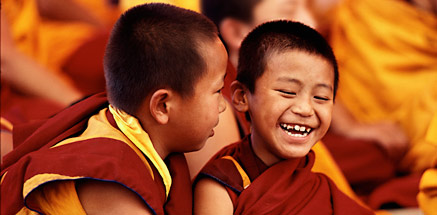
|
Glossary
Ananda - One of the principal disciples of the Buddha. He was a first cousin of the Buddha and was deeply attached to him. Asoka/Ashoka - Mauryan emperor and conqueror who ruled northern India in the 3rd century BCE. Asoka converted from militaristic violence to Buddhism. His conversion helped extend the spread of the Buddhist traditions beyond Indiaís borders. Astamahapratiharya - Term used when referring to all eight pilgrimage sites of events in the Buddhaís life together. Lumbini, Bodhgaya, Sarnath, Kusinagara, Sravasti, Sankasya, Vaisali, and Rajgir. Avalokiteshvara/Guanyin- Most popular and universal celestial bodhisattva. Bhikkhu/Bhikkhus - Fully ordained Buddhist monk. A female monastic is called a Bhikkhuni. Bodhgaya/Bodh Gaya - Site of the Buddhaís enlightenment, under a tree. Bodhi tree - Tree under which Siddhartha Gautama meditated and reached Enlightenment and became the Buddha. Bodhgaya is the location of this sacred pilgrimage site. Bodhisattva - Buddha to be; one who delays own enlightenment in order to devote his life to leading others to Buddhahood. Buddha - One who has awakened. Many names are used when referring to the Buddha, including: Siddhartha Gautama /Siddhattha Gotama (Siddhartha -his given name, meaning ìhe who achieves his aim,î Guatama ñhis family name) ; The Buddha - ìthe enlightened oneî or ìthe awaken oneî; Shakyamuni (ìSage of the Shakyasî ñ Siddharthaís father was king of the Shakya clan); Tathagata (the name used when the Buddha is reported as referring to himself instead of using the pronouns me, I or myself. ) Kusinara/Kusinagara/Kushinagar - Site of the Buddha's death.Circulating -- Act of traveling clockwise around a sacred place or object. Lumbini - Site of the Buddha's birth. Mahaparinirvana Temple --dedicated where the Buddha attained parinirvana, the final nirvana Pilgrimage - Journey to a sacred place as an act of devotion and faith. Prostration -- Placement of the body in a reverentially or submissively prone position Relic - Part of a body of a saint or a venerated person, or else another type of ancient religious object, carefully preserved for purposes of veneration, or as a tangible memorial. Relics are an important aspect of some forms of Buddhism, Christianity, Hinduism and many other religions. Sarnath - Site of the Buddha's first sermon/teaching. Stupas - Distinctive Buddhist shrine, a raised mound surmounted by a ceremonial pole and umbrella; contains the relics of a Buddha or enlightened saint, either the literal bodily relics or other items left behind, such as words in textual form or clothing items worn. |
This site created by Mary Muenster and Sarah Fendrick at the NEH Summer Institute "Literatures, Religions, and Arts of the Himalayan Region", held at the College of the Holy Cross, Summer 2011.

